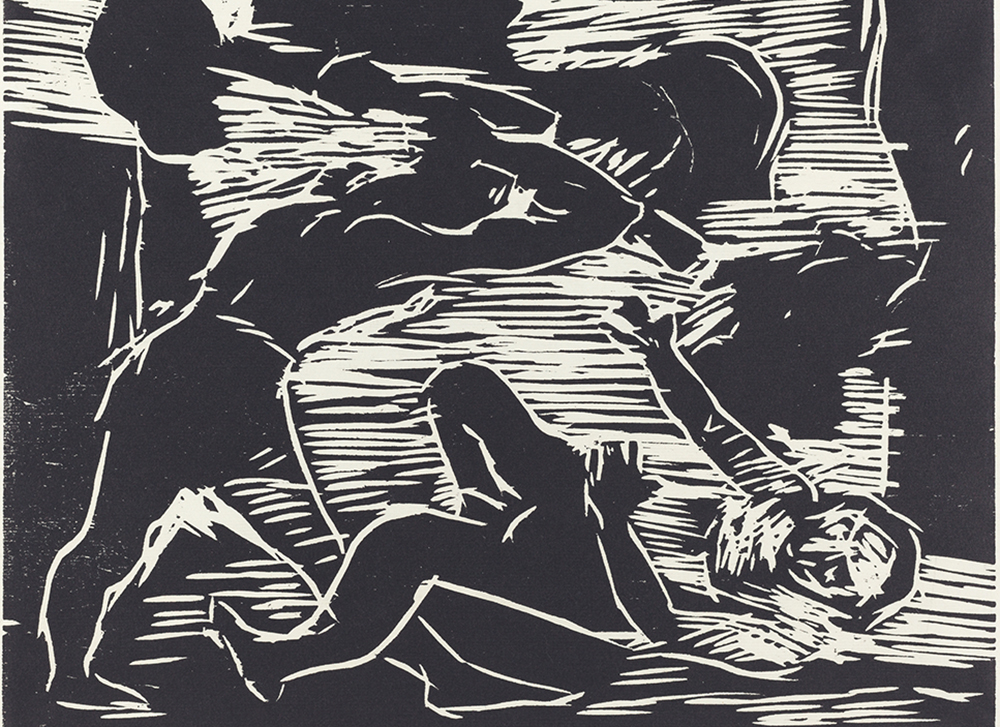
"Cain and Abel" (1919) by Lovis Corinth (Artvee)
Am I my brother's keeper?
Often, this phrase comes up as an ethical question when people mean to ask "What do we owe each other?" — like in Jodi Picoult's novel My Sister's Keeper. In the original story, however, it's telling that God doesn't even bother to answer this question. God sees through the facetiousness of the question and says, "I hear Abel's blood crying out to me from the earth!" You see, Cain had asked this question to get out of owning his responsibility for his brother's death, but it didn't work. God saw through his farce.
Today, the question of "What do we owe each other?" takes on a particular urgency as political discourse drives us apart, environmental devastation drives people from their homelands, and greedy ultra-wealthy corporations that refuse to pay their workers a living wage make basic needs like food and housing out of reach for far too many working families.
This urgency is what Pope Francis was getting at in his recently released apostolic exhortation Laudate Deum when he said that he realized in the eight years since he released Laudato Si', "our responses have not been adequate, while the world in which we live is collapsing and may be nearing the breaking point."
The question of what we owe each other is vast. What do I owe the sisters with whom I live? What do I owe the people in my neighborhood? In my town? In my country? Around the world?
I look back at Cain's question — an attempt to justify his own actions, his own greed. Then I return to the question today. I can't help but think of how the reality of the systemic injustice so many people face changes this question from a genuine "What do we owe each other?" to Cain's facetious "Am I my brother's keeper?"
Advertisement
A few weeks ago, I worked with some folks in Louisville to host a "Rally for a Better Federal Budget." Mary Danhauer, a member of the Network Kentucky Advocates Team and a retired nurse practitioner, talked about the impact of poverty and chronic stress on the body. "The pandemic made it clear that poverty is a cause of premature death, and poverty is a product of policy decisions. Thus, we call it 'policy murder.' "
Policy murder — like Cain murdered Abel. Perhaps unable to see the deadly systems, perhaps merely unwilling, we ask, "Am I my brother's keeper?"
These are the questions our political leaders should be asking as they craft policies that impact us. These are the questions we should be asking of our political leaders when we consider how to cast our votes.
What do we owe people forced to flee their homelands partially because of the impact of climate change brought about disproportionately by the emissions from the United States and other Western nations and partially because of the actions of the U.S. over decades to destabilize Central American countries in promotion of our own ends? Surely, we owe them more than being subjected to deadly conditions as they wait their chance to seek asylum in our nation.
What do we owe working people who face food and housing insecurity because the prices of food and housing have skyrocketed while wages have barely gone up? Surely, we owe them a federal minimum wage that keeps up with the cost of living — or at least reliable assistance through government aid to offset the failings of the economic system.
What do we owe people with vastly different political viewpoints than we have? Surely, we owe them treatment in alignment with their basic dignity that comes from the fact that they were created in the Imago Dei, the image of God.
Catholic social teaching makes it clear: it's not enough to be a good person. It's not enough to volunteer at or donate to our local food pantry. These things are good and important and commendable. But they're not enough.
As people living in a democracy, we have the power to push for the change we want to see.
We must work to change the systems that create poverty. We must work to uphold the dignity of work and the rights of workers through living wages, just work schedules, and safe working conditions.
We must prioritize the needs of people living in poverty and those who have been pushed to the economic and social margins of our society.
We must act to combat climate change — which means we must work together within and across national boundaries to create and uphold communal commitments.
We can do none of these things effectively when we do them alone. But there is good news: we can act together. As people living in a democracy, we have the power to push for the change we want to see — when we come together across our differences and act to ensure our government protects all of us, no exceptions.
Just a few weeks ago, our calls to Congress helped pass a temporary budget that had no harmful cuts to social service programs and no harmful immigration policies. This work continues. You're invited to join, to participate in a movement to create a society where we meet our moral obligations to each other.
In the Christian Scriptures, the First Letter of John looks back to the story of Cain and Abel with new eyes: "This, remember, is the message you heard from the beginning: we should love one another. Do not be like Cain, who belonged to the Evil One and killed his brother." May we act together to create a world with more policies that promote life than we see in our world today.




